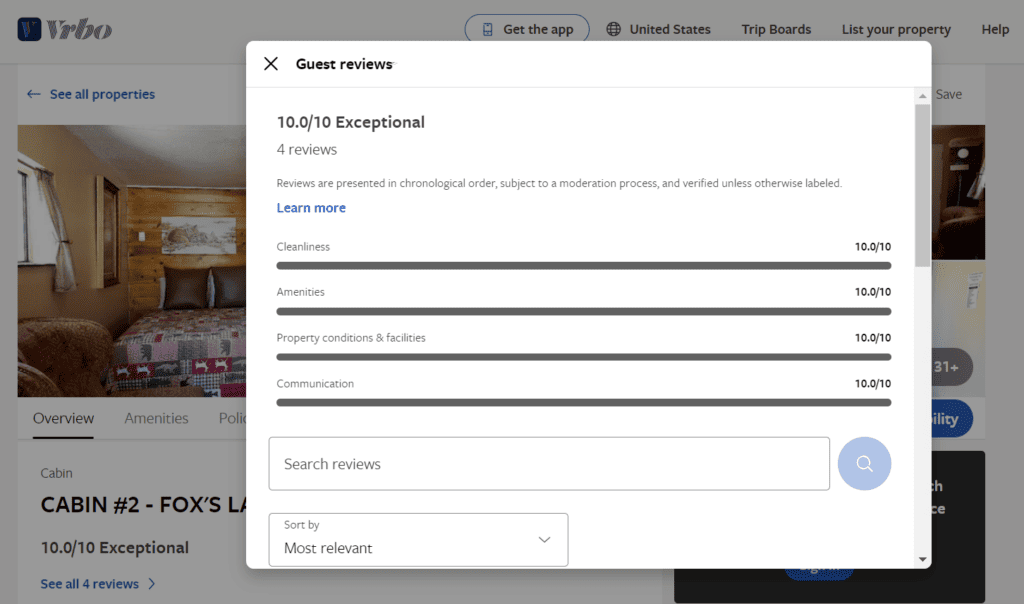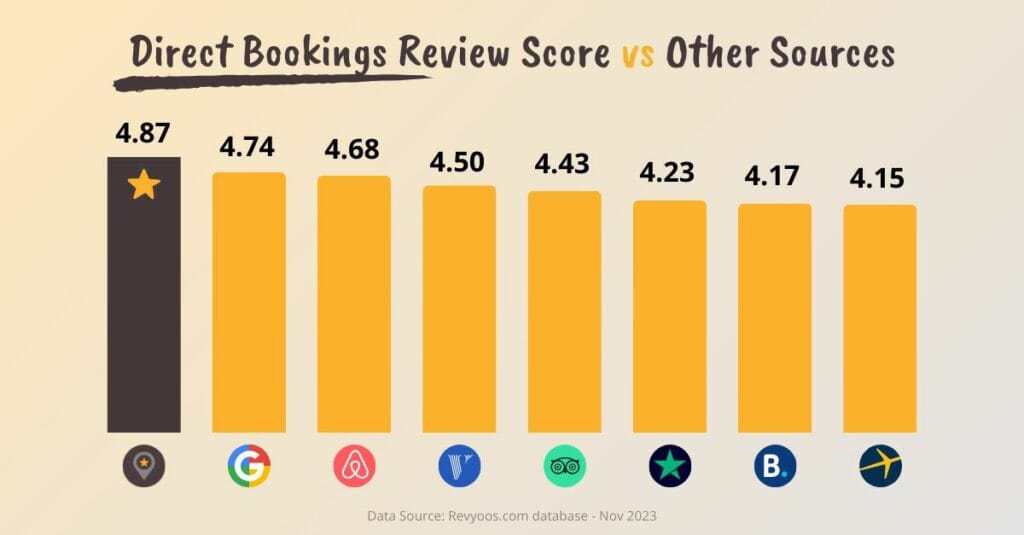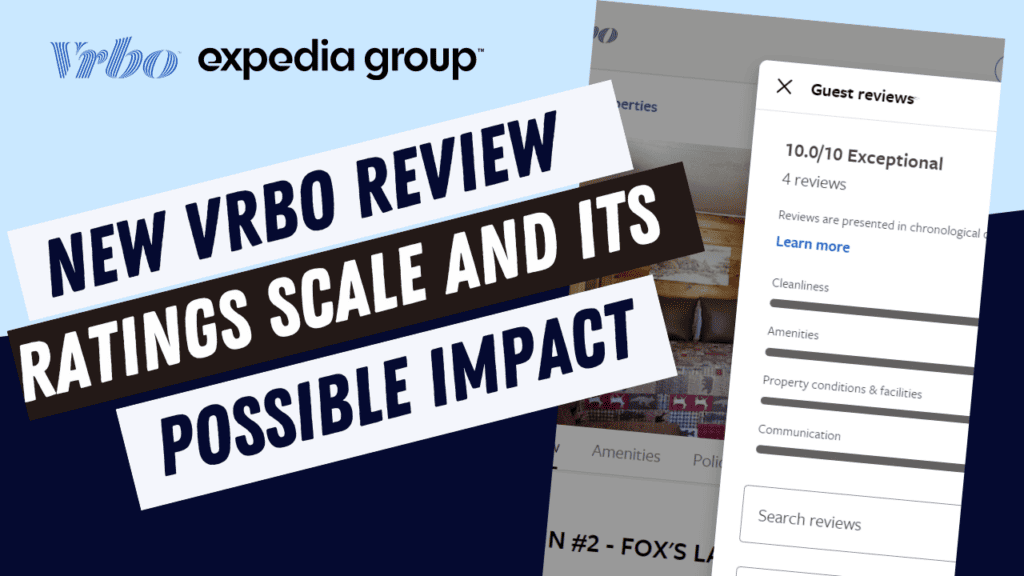Expedia Group has overhauled its review system, transitioning from a 1-5 to a 1-10 rating scale. The change affects not only its core platform but also casts a wave over its vacation rental brand, Vrbo. While this may seem like a subtle adjustment, the implications are significant, especially for hosts and property managers in the short-term rental industry. Reviews, a cornerstone of hospitality, wield immense power, and even the slightest modification to the system can reshape the dynamics of the game, potentially leading to lower review scores and, consequently, a host of challenges for those in the business.

The Nuanced Landscape of 1-10
Expedia’s move to a 1-10 ratings scale unfolds against the backdrop of the Coalition of Trusted Reviews, a product of the (anti) Fake Reviews Conference last year. Notably, Booking.com, a key participant in the conference, utilizes the same 1-10 scale, further emphasizing industry collaboration.
The shift to a 1-10 scale introduces a level of nuance previously absent in the 1-5 rating system. This expanded scale provides guests with more room for differentiation, allowing them to express subtleties that might have been overlooked in the narrower 1-5 framework. The expanded scale encourages a more detailed evaluation, providing guests with the means to differentiate between a good stay and an outstanding one.
The impact of this change becomes even more pronounced when considering the various factors influencing review scores:
Airbnb’s Two-Way Review System: Enforced Positivity?
Based on data recently presented by Christophe Salmon, founder of short-term rental reviews aggregator platform Revyoos, Airbnb emerges as the frontrunner among major booking platforms, boasting a review average of 4.68/5. In comparison, Vrbo held a rating of 4.50/5 prior to the adjustment in their ratings scale, while Booking.com garnered an 8.34/10 – equivalent to 4.17/5 when adjusted to a 5-point ratings scale.
However, the significance of this achievement goes beyond Airbnb’s perceived dominance in guest satisfaction. This can, at least in part, be attributed to Airbnb’s unique two-way review system.
Unlike many other platforms, Airbnb employs a review system where both guests and hosts have the opportunity to evaluate each other. This feature can foster a sense of community but also introduces a delicate dance between guests and hosts. One aspect is the phenomenon of guests being hesitant to leave overly critical reviews, driven by a concern about potential repercussions, fearing judgment from hosts they intend to book with in the future.
The apprehension of being labeled as too nitpicky or overly negative could influence guests to soften their critique, inadvertently contributing to an environment where higher-than-average ratings prevail.
This phenomenon is closely linked to a notion known as positivity bias, as pointed out by short-term rental analyst and consultant Richard Vaughton on LinkedIn. Positivity bias refers to the tendency of individuals to provide more positive feedback or higher ratings than warranted, often influenced by factors like politeness, social desirability, or a desire to avoid conflict.
Guests may find themselves delicately balancing honest feedback with the desire to maintain positive relationships within the Airbnb community. This cultural aspect not only impacts individual ratings but also sets a distinctive tone for the platform, where constructive criticism may take a backseat to the desire for amicable interactions between hosts and guests. It simultaneously places immense pressure on hosts to maintain high ratings in a place where anything below 4.8 is perceived as a red flag.
Cultural Differences: The Interplay of Norms in Rating Systems
The way individuals interpret and bestow ratings is also influenced by cultural nuances. European travelers, familiar with grading systems structured on a 1-10 or 1-20 scale – a familiar norm permeating various facets of life, from academia to everyday assessments – find a natural alignment with the 1-10 ratings scale employed by Booking.com. This is particularly noteworthy given Booking.com’s extensive customer base rooted in Europe, underscoring the cultural inclinations of its primary audience.
Within the EU context, an 8 out of 10 is generally regarded as commendable, reflecting a positive evaluation. This perspective, however, undergoes a perceptual shift when translated into a 1-5 rating scale. 8 out of 10 suddenly transforms into a 4 out of 5, suddenly a lot worse as a review rating. This shift underscores the delicate interplay between cultural norms and rating systems, demonstrating how the same numerical value can carry distinct connotations depending on the scale employed.
Managing Expectations on Booking.com: A Host’s Dilemma
Booking.com, while widely popular, faces frequent criticism from hosts who lament the limitations imposed on them when attempting to convey crucial details about their properties to potential guests. Juan Betancour, a host at Living Las Canteras in Spain, encapsulates these concerns on LinkedIn, shedding light on the platform’s constraints: “For example, the fields where we can describe the property and ourselves as hosts are very limited and not very visible in the listings; there is no option for photo captions, etc.“
Originally designed as a platform primarily catering to hotel accommodations, Booking.com guests can sometimes be unaware that they are booking a short-term rental. The absence of nuanced property descriptions, coupled with limited visibility for host details, contributes to a significant information gap. This oversight often leads guests to anticipate hotel-like amenities, such as a front desk, only to be disappointed upon arrival when no such services are available.
Compounding this issue is the platform’s communication infrastructure, which many hosts find to be clunky and less intuitive compared to other short-term rental platforms. In essence, while the property itself may be exceptional, the disconnect between guest expectations and the reality of the rental experience becomes a substantial contributor to lower ratings.
Disparities in Scoring on Booking.com: Decoupling Sub-Scores and Overall Ratings
Booking.com, once distinguished by a rating system where guests evaluated various aspects of their stay through sub-scores like cleanliness, service, and amenities, underwent a shift. The platform migrated towards a system akin to Airbnb’s, where guests continue to rate individual sub-scores independently. However, a crucial departure lies in the decoupling of these sub-scores from the overall rating.
Under the revamped system, a guest could assign stellar ratings of 10 to each sub-score, signifying exceptional experiences in every category. Despite this, the overall score might not mirror the excellence depicted by the sub-scores, leading to a perplexing and, at times, disillusioning disparity. Instances where a property receives top marks in every aspect but a seemingly incongruent overall rating of 6 are not entirely unheard of, introducing a layer of complexity to the guest evaluation process.
Booking.com justifies this departure by asserting that the overall score may encompass factors beyond the specific sub-scores. While this reasoning aims to provide a more holistic representation of the guest experience, it inadvertently introduces potential inconsistencies and discrepancies in how guests interpret and assign ratings.
The Direct Booking Advantage
In his follow-up post, Revyoos Founder Christophe Salmon delves deeper into the findings, revealing that the highest average rating of 4.87/5 is for direct bookings.

A key element contributing to the high ratings in direct bookings is the establishment of a more personal connection between hosts and guests. By circumventing intermediary platforms, guests experience a reduced sense of anonymity, fostering a stronger rapport with hosts. This heightened personal connection creates an environment where guests are more inclined to leave positive reviews, buoyed by a sense of familiarity and genuine interaction.
Equally crucial is the freedom that direct bookings afford hosts in controlling guest communication. Hosts can provide extensive information about their property and the destination, ensuring that guests have a comprehensive understanding before arrival. Unlike on mainstream platforms such as Airbnb, Booking.com, and Vrbo, hosts booking directly can go the extra mile by posting videos, offering an immersive preview of the property and the surrounding area.
The ability to share videos becomes a distinct advantage, allowing hosts to showcase unique features, highlight amenities, and provide a virtual tour that goes beyond the static images permitted on other platforms. This added layer of information not only enhances transparency but also contributes to a more informed and satisfied guest, laying the groundwork for the exceptional ratings observed in direct bookings.
Conclusion
How will the industry’s commitment to transparency influence the future of guest reviews? Will the Coalition of Trusted Reviews become a cornerstone in combating fake reviews? And, as hosts adapt to evolving systems, how can they bridge the gap between expectations and reality to cultivate exceptional stays and stellar reviews? The questions linger, inviting active engagement in shaping the future of the short-term rental industry.








